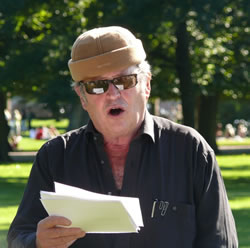|
The first twenty years of my writing life seemed something of a zero. That's how long it took me to finally write a story I felt confident was good enough—my first published fiction. Viewed another way, however, you might say that's how long it took me to learn to write. Because after I sold that first story, things began to move. I can't quite say it got easier, but now I had been to the place where my stories were and knew the landmarks, could find my way back again. In the second twenty years, I published twenty books and hundreds of stories and essays and won some prizes, and at the end of last year landed a lucrative contract to do two novels with a large international house.
But back when I had only published two or three stories, although I had been at it for years, when someone asked me what I did, I felt funny claiming to be a writer. Did I really have to identify myself with the office job that paid my bills even though I considered writing the most important thing I did?
I asked a former teacher, now friend, Gordon Weaver, who had published a dozen books, at what point he felt comfortable saying he was a writer. His answer was something I wrote behind my ear, an important statement that I share with my students to this day: "A writer is someone who writes. A serious writer is someone for whom writing is the most serious activity he or she knows. The amount of publication, money, fame you might get—these are extra-literary factors." With those words, I felt I could call myself a writer.
Another important lesson I share with my students is one that on its face might seem harsh, but in fact is merely honest. It is something that R. M. Rilke says in Letters to a Young Poet, a beautiful book that I urge all writers who have not yet done so to read. What he said to his young poet was something I had already learned, but Rilke's authority formalized for me. I learned it by using twenty years trying to write, years that sometimes, often, seemed fruitless, but I couldn't quit. Tried to quit. Couldn't. So it was a beautiful moment of confirmation for me when Rilke wrote to his young poet that he had to look into his heart and ask himself, Must I write? If your answer is yes, then that matter is settled. But if your answer is no, you have also gained important self-knowledge. If you can quit, you probably should seriously consider doing so.
Why? The answer to that is the third major lesson I have learned about writing and which I try to impart to my students. Of all the rewards you get or do not get as a writer, the single most important reward must be the act of writing itself. Surely every serious writer has experienced this reward when she or he is working at top end—when you are in perfect harmony with the place your words come from, the place where your stories are waiting to be told. I do not want to seem mystical about this, but in my experience that is a sacred place, and entering it is the closest thing I know to a spiritual discipline. No reward—money, fame, publication—is greater than the privilege of gaining entry to that place.
Finally, and closely connected with that, a word about the words. Henry Miller once said that if you don't listen when the Muse sings, you get excommunicated. The fastest way to a writer's block is to be super-critical of the words that are offered up from whatever part of our mind, soul or body that the words are offered up from. A writer has an impulse to write something but generally, in my experience, does not know what he or she is going to say until it is said. To berate and reject the words that are being offered up to you even as they are being offered up is to insult that in you which is most important to you as a writer, that place where the spirit becomes word and takes form.
Thus, the fourth most important lesson I have learned and try to share with my students is just that. Allow your story to tell itself, allow your words to take form, do not discourage them. Afterwards, after you have a draft, that is the time to put your critical spectacles on and begin to cut, expand, rephrase, polish, revise. But first allow the vision to come forth; only later the revision. Allow your words to speak, allow your stories to be told.
|


